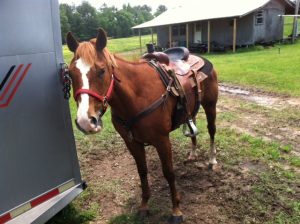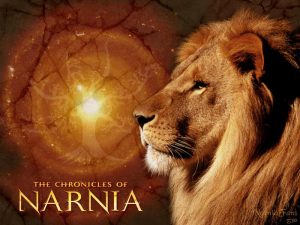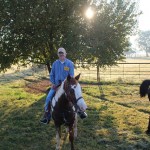
Our 5-year-old AQHA gelding
I’ve been riding Knockout for about a year now. When we first started, Knockout was an energetic, spooky, young, green-broke horse who seemed to always be looking for an excuse to bolt.
We’ve come a long way across the past year!
Knockout is now much more confident and relaxed under saddle. Just in the last three months I’ve begun viewing Knockout as becoming a pretty solid horse.
Across the last month, I’ve felt the balance start to tip the other direction. Knockout has gone from generally being a little on the spooky end of the scale to generally being a little on the lazy end of the scale. While going down the road at a fast trot, he is more likely to want to slow to a walk than to want to pick up to a lope.
I feel I have really gained his trust to the point he has begun to feel comfortable expressing his preferences. Considering where we started, this is a welcome phase to work through!
One preference that has surfaced is a preference to stay home rather than going out for a ride down the road. I can’t say I blame him much. Eating grass in the pasture with the other horses is bound to seem a more enjoyable pastime than carrying me down the road.
It has become an issue, though, because of his persistence. Initially, he would avoid starting down the road, but once started he would do fine. Then he got to where he would keep trying longer to turn around. So, for maybe the first quarter mile he would keep looking for an excuse to turn back, before finally settling into the ride.
We would start straight down the road, then Knockout would start to turn right as though hoping I would let him turn around and head home. When I first felt him start to step right, I would interfere with a light touch of either rein or leg to let him know he was to keep going straight. But Knockout would push through the light cue persistently trying to turn. So, I would come in with a heavier cue to let him know, “No, I really meant what I said! Keep going straight.” Knockout would then respond to the heavier cue with an exaggerated response of going too far left…which would require my correction from the left side…to which he would over-respond back to the right. So, for the first quarter mile or so we sort of zig-zagged down the road until Knockout finally settled into the ride and responded well to light cues.
That was a little annoying, but not terrible. I figured it was just a phase that would work itself out with a few more rides. Except it didn’t…in fact it got worse. Gradually, across a few weeks, that quarter mile of reluctance turned into a half mile…then a mile…then two miles. It got to the point we were riding further and further from home just because I was determined not to turn around until after he had relaxed into the ride. I didn’t want Knockout to get the idea that his persistence had paid off.
I finally decided it was time to try a different approach.
Since Knockout seemed determined to head for home, I decided to just let him go…but to make sure it was more work than going on a ride.
Our next ride, as we left the driveway to start up the road, Knockout dodged left and I just went with him. I gave him his head and let him start back for the driveway while pushing him up into a fast trot. But I never let him go past the gate at the end of the drive. I just turned him and put him into trotting circles at the end of the driveway.
Initially, we just trotted random circles and figure-eights. Then we settled into an oblong loop with a long side running along the road in the direction I wanted to go. While in the straight stretch, I dropped all pressure, put plenty of slack in the reins, and looked down the road. When Knockout turned right to start up the drive, I let him go but came in asking for a fast trot and turning him back into the oblong circle again.
So, once within each loop I offered Knockout the good deal of going on a nice relaxed ride up the road. When he chose to turn for the drive, I put him back to work trotting circles.
We did that for a while…a long while…like over an hour. I didn’t make it any more difficult, but I also didn’t let it become any easier. When he tried to shorten the loop by cutting off a corner, I didn’t let him. When he got sloppy following prompts around the circle, we worked on smooth turns and collected cadence. I adopted the attitude of, “Hey, I’ve got all day. We can either go for a ride down the road or we can stay right here trotting circles and working on cadence. It doesn’t matter to me. We’ll do whichever you want.”
Finally, Knockout decided to take the good deal and go straight under a loose rein! For about four paces…then he turned back. So, we fast trotted back to the end of the drive and went right back to trotting circles again. And we repeated that scenario a few times…
In the end, Knockout decided maybe going for a ride was a pretty good idea after all, and we finished with about a two-mile ride on a loose rein at a relaxed walk on light cues. It was great! 😊
So, why did I change tactics? What caused me to switch from being persistent in my prompts to letting Knockout choose where to go? That’s a fairly major change of strategy!
Two things, really. Primarily, I changed because my initial approach was no longer working. It didn’t make sense to keep trying the same approach when that approach wasn’t yielding the desired results.
Secondly, I changed because I realized Knockout was becoming increasingly resentful of our rides. His persistence in trying to turn back was being met by my persistence in directing forward. So, the rides were becoming a huge contest of wills with me persistently preventing Knockout from doing what he wanted.
I had to reassess my approach because that was not my goal. My goal is not to keep Knockout from doing what he wants. No, my goal for Knockout goes much deeper.
My goal is to transform Knockout’s thinking so much that what he wants most is to be with me following my cues.
I don’t want to subvert Knockout’s will to obey mine. Rather, I want to transform his will to follow mine. I want Knockout’s greatest confidence to be in me. I want his greatest comfort to be abiding in that quiet rest beneath my saddle and between my legs awaiting my next cue.
I don't want to subvert my horse's will to obey mine. Rather, I want to transform his will to follow mine. Click To TweetGiven a free choice between following my light cue or doing anything else, I want Knockout’s preference to become following my prompt.
Isn’t that similar to how the Bible describes God’s goals for us?
Therefore I urge you, brethren, by the mercies of God, to present your bodies a living and holy sacrifice, acceptable to God, which is your spiritual service of worship. And do not be conformed to this world, but be transformed by the renewing of your mind, so that you may prove what the will of God is, that which is good and acceptable and perfect. (Romans 12:1-2)
Now the Lord is the Spirit, and where the Spirit of the Lord is, there is liberty. But we all, with unveiled face, beholding as in a mirror the glory of the Lord, are being transformed into the same image from glory to glory, just as from the Lord, the Spirit. (2 Corinthians 3:17-18)
Notice how these two passages emphasize the need to present ourselves ready for service…prepared to cooperate with His transforming work in our lives. Also notice the emphasis on our liberty in Christ…superimposed with our being transformed to “prove what the will of God is.”
Much like my goal for Knockout, God’s goal for me is not to subvert my will to obey Him. Rather, His goal for me is to transform my will to follow Him.
God's will for me is not to subvert my will to obey Him. Rather, it is to transform my will to follow Him. Click To TweetThis is why legalistic religion focused on finding and following ‘biblical’ rules and exceptions can never attain righteousness before God. God’s goal isn’t about us knowing and following rules…it is about our being transformed through spending time with Him.
Just as Knockout does not know from one ride to the next where I may want him to go or what I may ask him to do, in the same way we do not know from one life circumstance to the next where God may lead us or what He may ask us to do.
I don’t hand Knockout a road map and say “Here follow this…over the same route…every ride.” Rather, I go with Knockout and direct each step of his path to go where I want him to go and do what I want him to do on that particular ride. My goal for Knockout isn’t to get him from point A to point B by a specific route. Rather it is to have a relationship with him that is characterized by his being so in tune with me that he simply goes wherever I ask. My focus with Knockout’s training is on developing the relationship such that responding to my prompts is not a burdensome thing but a natural overflow of his confidence in me as his leader.
In much the same way, God’s goals for me focus on developing our relationship such that I can hear His voice and respond to His prompts as a natural overflow of my confidence in Him.
Of course, God’s goals for me go much deeper than my goals for Knockout. I am seeking to transform Knockout’s mind, whereas God has promised to transform my heart, through the power of The Holy Spirit, to be conformed to the image of Christ.
And we know that God causes all things to work together for good to those who love God, to those who are called according to His purpose. For those whom He foreknew, He also predestined to become conformed to the image of His Son, so that He would be the firstborn among many brethren; and these whom He predestined, He also called; and these whom He called, He also justified; and these whom He justified, He also glorified. (Romans 8:28-30)
Knowing this, I can face the unknowns of the future, not with fear and trepidation, but rather with joyful anticipation, fully confident of His loving care for me and His promise to transform me.
Knowing this, I should not be focused on trying to define and defend all the rules and exceptions…nor on adding more rules on top of rules to avoid even “the appearance of evil.” Rather, I should be focused on spending time with God, learning to hear His voice and respond.
Your thoughts?

 In rereading C.S. Lewis’ The Chronicles of Narnia, I’ve been fascinated by Lewis’ portrayal of how Aslan’s will is worked out in Narnia.
In rereading C.S. Lewis’ The Chronicles of Narnia, I’ve been fascinated by Lewis’ portrayal of how Aslan’s will is worked out in Narnia.